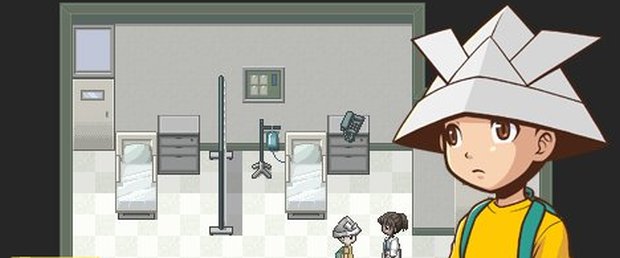Wot I Think: Rakuen
Having a bawl
Composer, performer and now developer Laura Shigihara’s first game, Rakuen [official site], is out now, and it is something truly special. In a To The Moon sort of way. A hilarious and heartbreaking tale of loss and redemption, with songs. Here’s wot I think:
Rakuen is a book, a story regularly read to a young boy by his mother, about a magical land wherein lives the Guardian of the Forest, a creature who grants wishes. After his hospitalisation, the boy’s mother visits him each night to read the book, and eventually reveals to him a secret: the book’s world is real, and together they can visit.
Which might, alone, sound a perhaps twee set-up for a game. However, this is directly contrasted by the cruel reality of the hospital, and mature topics like dementia, disease and death. Following some sort of incident the whole hospital building is in recovery, the staff still shellshocked, areas still being rebuilt. Other patients in nearby wards have complex stories behind their reasons for being there. There's an abundance of darkness to match that light.
In this combat-free RPG, you explore both realities as they intertwine and overlap, delving into patients’ lives and emotional backstories, and meet a vast, utterly lovely cast of deeply crafted characters.
I think it’s important to get To The Moon comparisons out of the way at the start. Shigihara worked on that splendid game’s music, and was clearly inspired by it in Rakuen’s inception, but beyond this the links are mostly incidental. Both certainly are about exploring people’s pasts on some level, and both are presented in RPGMaker meaning there’s that unavoidable look, but Rakuen is very much its own distinctive thing. If anything, it feels like a more fleshed out, more elaborate game than Ken Gao’s gorgeous tear-jerker.
RPGMaker is a restrictive engine, limited to a weeny 640x480, and only scaling up to fullscreen. Fortunately, Shigihara has ensured the game stands out in so many ways, crafting something really wonderful from its confining limits. The use of lovely close-up character art, and brilliantly bright and cheerful pixel backgrounds, immediately helps it to stand out from the Steam churn. And on top of that, the game is smart with some subtle nods in the design.
At the very start the game is displayed in a green-grey monochrome, echoing the look of early Gameboy RPGs. It’s a hospital ward, you’re playing a young boy (with no given name) who’s lying in bed, visited by a couple of other characters. And then someone switches the lights on and colour fills the room. And colour is so important here.
Character animations and movement are another crucial factor. They are implemented here with a deft hand, outreaching the limitations of the engine via some sublimely fun and daft rushing about. In fact, to pay it quite the compliment, at times I was reminded of the outstanding character movement in the Mario & Luigi RPG games. Lovely extra details are all over, like the moving sunbeams that shine across the land of Rakuen, or the gruesomely grim tones evoked during nightmarish sequences, making the engine far prettier or more adaptable than you might have realised it could be.
The result is the washed out, near-monochrome hospital that is suitably sombre, contrasted with the vivid and explosively colourful world of Rakuen, a huge and sprawling village that gradually opens up to you as you progress, replete with floating islands in the sky, elaborate underground cave networks, and the best tea shop you could ever imagine.
There is so much to celebrate here, and I want to start with what stood out the most: this is the only game I can think of that so prominently features a mum. Boy (as the game only ever refers to him) is accompanied for most of the game by his mother, the two of them exploring both the hospital and the world of Rakuen together. This has two enormous effects - firstly it puts a dynamic relationship at the centre of the story, the two able to chat at any point, Mom able to offer hints, and most importantly, chat to and argue with the game’s characters alongside you. Secondly, it dramatically changes how your approach understanding and interpreting the game’s use of fantasy. A child escaping to a fantasy world because of his internment is hardly original, but sharing that experience with an adult makes the questions you’ll be asking yourself far more interesting.
And questions you’ll ask, because there are equivalents to everyone you meet in the hospital in the fantasy world, sharing allegorical stories, with actions both physical and relational having an impact in both. The core of the game, after a bravely ordinary establishing first hour or so, is trying to understand the circumstances of the other patients on your hospital floor, via both their Earthly reality and their fantastical counterparts. So, for instance, there’s Tony, a grumpy old git in the room next to Boy’s, who rejects all visitors but peculiarly guards a delicate music box. In the other world he’s a miserable bear who regularly attacks the village to destroy things for the sake of it. At a certain point in the game you enter an extensive sequence where you explore Tony’s life, but predominantly as expressed by his bear-version, meeting his bear wife, raising their bear cubs. During these sections, one for each of the four main characters whose lives you investigate, the game so brilliantly intertwines fantasy and reality, jarringly jumping from one to another on occasion to great effect, pulling out the fantastical rug from under you at key moments.
And yes, bloody hell yes, I cried. I sobbed. And not just once. While my only real criticism of the game is that it’s perhaps a little too morbid at times, the emotional hits are deep and powerful, and only possible because of the phenomenal character work. Despite lasting around ten hours (it’s possible to finish faster, but there are lots of lovely hidden extras and collectable treats to keep you there for much longer), and despite such an enormous cast, characters are intricately woven and relatable, and I’ve come away feeling like I know so much that’s so meaningful about so many.
It is a bit too sad. There’s no getting away from that. The game tries to be about one-too-many sad things at once, just pushing its luck a little far. I can’t say what any of them are, as each is so smartly drip-dripped into the story as you progress, but I did end up thinking, “Hey, ok, come on - give them a break.” It never trips over into misery porn, it’s worth saying, and each topic is sensitively explored, but it’s definitely a lot to take on. Although it’s fair to argue that there are rarely happy reasons for anyone to be enduring a long-term hospital stay, it’s just that on top of that… well, I can’t say.
Shigihara’s being both French-American and Japanese is something that seems really apparent in the nature of the game. Japanese gaming influence is throughout, despite an often ambiguous setting - both Japanese and Western names and characters appear, and the mythology seems to stand with a foot in both regions too, reflecting both Japanese and Germanic folklore. The influence of many Eastern RPGs is very apparent, but so is that of ‘90s American point and click adventures. It’s a really splendid merging of cultures, reminding me of the extremely pleasing peculiarity of the Phoenix Wright games, where the ostensibly Japanese setting is made oblique and more immediately accessible by the Westernised writing and descriptions.
Musically, as you might hope from a game composer, it's wonderful. Really wonderful. Some of the songs might not be to my particular tastes, but the background music is consistently brilliant and evocative.
The result is something enchanting. I haven’t felt so swept away by a world in so long, and was utterly compelled to explore it as deeply as I could. The game’s brutal sadness is absolutely countered by the infectiously cheerful silliness of so many of its fantasy characters, reminding me (and I realise this is oddly specific) of the lovely humour in Dragon Quest Heroes: Rocket Slime. What I’m saying is: it’s very funny. Very often. It’s an emotional rollercoaster.
I adore this. I am so frustrated that it’s very hard to convince people to pick up an RPGMaker game, so I’m also very relieved it has the To The Moon alumni tag that will hopefully convince people to grab it. Grab it you absolutely should. Yes, it’s maudlin in places, and yes, it’s undeniably a bit twee, but it earns the right to be by being just so good.
Rakuen is out now for Windows, Mac and Linux via Steam for £7/$10/€10.












